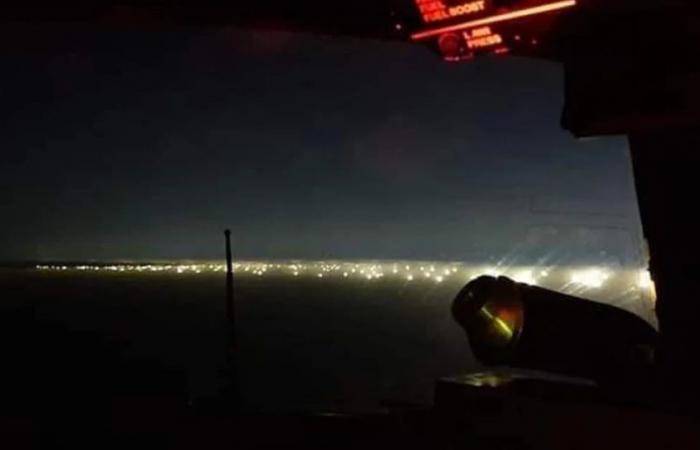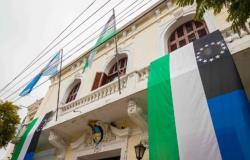In the midst of political and market noises and a Staff Report of the International Monetary Fund that explained the differences of the organization with the economic policy of the government and, in particular, with the exchange policy and the management of the dollar, Argentina took a step forward in the week to take care of its fishing wealth by avoiding fishing indiscriminate use of foreign vessels in the so-called “Mile 201” or external edge of the Argentine Sea, whose interior is an “Exclusive Economic Zone” for fishing by vessels with the national flag.
That step was the signing in New York, by the chancellor Diana Mondinoof the Agreement for the Conservation and Sustainable Use of Marine Biological Diversity in Areas Outside National Jurisdiction”, better known by its acronym BBNJ (Biodiversity Beyond National Jurisdictions).
This is “a fundamental step to protect Mile 201,” agreed the Non-Governmental Organizations Circle of Environmental Policies and Por el Mar. Also the Argentine Naval Prefecture, the force in charge of protecting the Exclusive Economic Zone from incursion by the foreign fleet that fishes on the edge and sometimes inside it said that the agreement is crucial to regulate “uncontrolled” fishing activity beyond national jurisdiction, in which the force has located hundreds of foreign vessels, mostly from China and to a lesser extent from Spain, South Korea and Taiwan.
“International waters” (that is, beyond Mile 200 from the maritime coast) are not subject to consensual laws, unless there are agreements in this regard between coastal states, something that in the case of the Argentine Sea becomes complex due to to the English military presence in the Malvinas Islands.
In the absence of agreement between the coastal states, however predatory and uncontrolled it may be, fishing in “Mile 201” of the Argentine Sea is not considered “illegal”, but it does greatly affect what happens within the Exclusive Economic Zone. Not so much because of the sporadic incursions of foreign ships into it, as occasionally happens, but because the fish do not know borders and because – as he already said Infobae– the foreign fleet, when fishing on the edge of the continental slope, especially between latitudes 43 and 47, in the so-called “Blue Hole”, where the confluence of the warm Brazilian and cold Malvinas currents generates a high concentration of squid and the shallow depth facilitates their capture, end up affecting the “escape rate” of a species with a short life cycle (between one and two years) and key in the food chain of the Argentine Sea.
The BBNJ agreement said Milko Schvatzmanresponsible for the CPA Oceans program and systematic researcher of what happens at “Mile 201”, the BBNJ “is essential to protect and advance the responsible exploitation of marine resources that are the heritage of humanity and on which they depend largely South American countries.
Argentina thus joined the 90 nations that have already signed this international instrument within the Framework of the United Nations Convention on the Law of the Sea. The agreement allows, once implemented, the creation of protection areas on the high seas, as What could happen in Mile 201, an area that both the CPa and the NGO “Por el Mar” consider “an area of intense fishing pressure without any control.”
According to Martina Sasso, founder of “Por el Mar,” right on the edge of the Argentine Sea, at mile 201, Argentina is the protagonist of one of the greatest fishing pressure points on the planet. The implementation of the BBNJ agreement provides one more tool to combat illegal, unregulated and unregulated fishing. “This framework gives Argentina the possibility of proposing a marine protected area outside national jurisdiction that allows it to put an end to the plundering of our fisheries in the hands of more than 500 foreign vessels.”
The BBNJ Agreement that was adopted on June 19, 2023 and has as its pillars the fair and equitable distribution of the benefits of marine genetic resources; environmental impact assessments; capacity building and marine technology transfer; and the implementation of area-based management tools, including marine protected areas. Argentina was a protagonist in the genesis of the BBNJ and in the crucial processes in which the UN decided to advance an agreement of this scale, such as the Rio+20 summit, in 2012.
According to the Environmental Policy Circle and By the Sea, “the next step, now, is for the country to advance in the internal ratification process, so that the Agreement can come into force, and it is possible to create Marine Protected Areas (MPAs). really effective in international waters.”
In principle, the Agreement excludes the possibility of discretionary interpretations related to sovereignty conflicts, which is precisely one of the obstacles or pretexts that have been pointed out to explain Argentine passivity in the control of Mile 201.
“From the organizations that have been working for years for its entry into force, we recognize this important step towards the conservation of the marine resources of the South Atlantic and the entire planet,” said Schvartzman.
“Mile 201 is known for its marine wealth due to overflow and extension of the Argentine marine platform less than 200 meters deep outside mile 200, attracting intense fishing activity that has generated concerns about sustainability and unfair competition. The agreement could be crucial to regulate uncontrolled fishing activity in this region,” the specialized publication Pescare noted in a note, which also highlighted the support of the Prefecture.
The South Atlantic is one of the most overexploited areas on the entire planet due to uncontrolled fishing carried out by more than 500 vessels from China, South Korea, Taiwan and Spain. Argentina is one of the most affected by this type of deep sea fishing since the ecosystem is the same inside and outside the Exclusive Economic Zone. At the same time, while fishing is taking place at mile 201, some boats have entered illegally, affecting national sovereignty.






